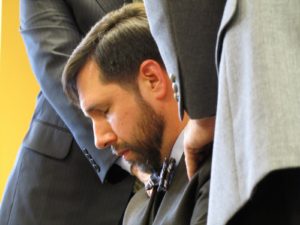
The second sermon recorded by Kimnach in his tenth volume of The Works of Jonathan Edwards is, “The Value Of Salvation.” The text is Matthew 16:26
“…what is a man profited, if he gain the whole world, and lose his own soul…?”
It is clear that Edwards followed God’s lead in creating a sermon full of “most powerful arguments” for making one’s soul utmost priority.
I learned from the way Edwards described our tendency to get earthly things: “If he hugs them [bags of gold and silver] ever so close, he must leave them forever and ever when once he leaves the world” (p. 313, emphasis added).
Then, as I’m seeing so many times in his sermons, Edwards is a master at creating powerful images to illustrate truth. Speaking of Alexander Magnus [The Great] when he was dying:
“he whom the whole could not contain must at last be confined to only a narrow grave. A few square feet of ground is large enough for him now, whom the earth was not broad enough for before” (p. 314)
Ouch!
When he turns to the inestimable worth of salvation, among several statements he wrote,
“They shall be perfectly delivered from sin and temptation. The saved soul leaves all its sin with the body; when it puts off the body of the man, it puts off the body of sin with it. When the body is buried, all sin is buried forever, and though the soul shall be joined to the body again, yet sin shall never return…” (p. 323)
Anyone in the house that realizes their sinfulness will surely smile at the thought of our bright, sinless future.
Edwards begins to wrap up the sermon with these these exhortations:
“We have now heard the most powerful arguments in the world to persuade us [to] take care of our souls….let us take no thought for this present any otherwise than as the means of the good of our souls.” (pp. 329, 330).
Finally, speaking of the Christian life in terms of a race or fight, “men don’t use [to] stop sometime and run sometime when they were upon a race; men, when they are engaged…in a battle, don’t use to stand still now and then to rest when their enemies are about them, for if they so do they are in danger every minute of being killed” (p. 333).
I hope that these excerpts from Edwards will fuel your desire to preach and teach God’s Word so He receives glory in the church and in Christ Jesus (Ephesians 3:21).
Randal










